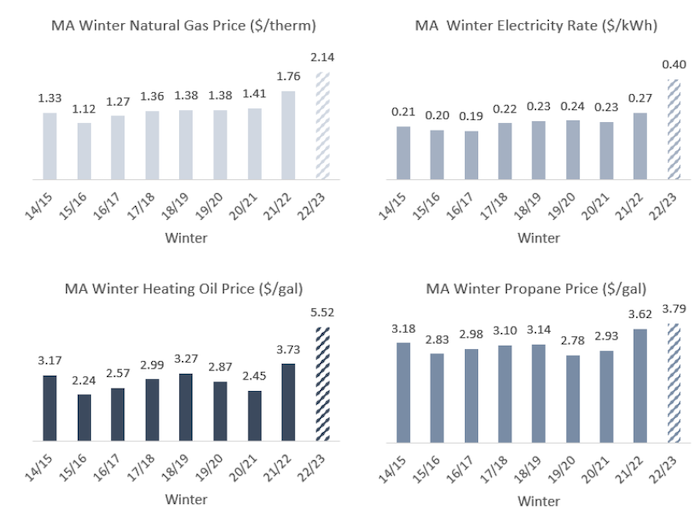
A Massachusetts fossil fuel lobbying review
As gas prices and heating costs skyrocket across Massachusetts, fossil fuel producers and providers are spending hundreds of thousands to promote their political agendas to state officials and lawmakers.
The state’s five for-profit utilities, which function as regulated monopolies responsible for distributing gas and electricity to residents, cumulatively spent more than a million dollars on lobbying in 2022, a 17% increase compared to 2021.
Meanwhile, other companies and business groups profiting from the sale and distribution of fossil fuels, including the Associated Industries of Massachusetts, Shell Oil Company, Kinder Morgan, Enbridge, and the American Petroleum Institute also maintained expensive lobbying operations focused on climate and energy policy in the Commonwealth.
As the lobbying industry booms, the cost of residential natural gas heating this winter is projected to be about 28% higher than last winter, continuing a two-year trend of rapidly increasing natural gas prices. Since the 2020-2021, the winter cost of natural gas in the state has a projected increase of more than 50%.
According to Massachusetts law, lobbying includes any attempts to influence state officials on matters of regulation, legislation, rules, standards, or general policy, or attempts to influence elected state officials on bills yet to be passed.
Gas utilities used their lobbying operations in 2022 to oppose bills promoting solar energy, heating electrification, gas safety, ratepayer protections, and community representation in utility proceedings.
While utilities are prohibited from financing their lobbying expenses with the heating bills of residents across the Commonwealth, there are a few loopholes that can be exploited. For one, if a utility can prove that the lobbying directly benefits ratepayers, it can be included in the rates the utility charges. Utilities have also previously pushed the state to include in their rates funding for business organizations or trade groups—which exist in part to pursue shared political goals.
It is up to the state’s Department of Public Utilities (DPU) to determine what expenses the utilities can and cannot include in their rates, which customers in a utility’s service territory are required to pay if they want to keep their heat and electricity running.
“Of course, the utility will always say that their lobbying benefits ratepayers. The question is if the DPU allows that argument to stand,” according to David Pomerantz, executive director of the Energy and Policy Institute, a utility watchdog organization.
“Utility rate cases where this is all decided are voluminous, months-long affairs and it’s easy for regulators to miss certain costs, or to decide there are bigger issues to fight with the utility about,” he added. “And some regulators are more or less inclined to fight with the utility in the first place.”

Powerful allies
The two largest gas and electric utilities in the state, National Grid and Eversource, both spent hundreds of thousands on their lobbying operations last year. Eversource spent a total of $360,000, while National Grid spent more than $400,000.
Research has shown that the utilities have historically been the most influential industry on climate and energy policy in the state and have powerful allies with their own significant lobbying operations, including the Associated Industries of Massachusetts. AIM promotes itself as “the state’s largest business association serving the needs of more than 3,400 businesses,” and its dues-paying members include utilities National Grid, Eversource, and Unitil. Other AIM members include fossil fuel industry appendages like Enbridge and the American Petroleum Institute, a known funder of climate misinformation.
AIM spent more than $300,000 on its lobbying operation in 2022, which included lobbying on the legislative session’s major clean energy bill, along with executive lobbying on a host of energy issues. Not all of AIM’s lobbying was focused on issues directly related to energy though; other AIM lobbying activity included their opposition to various bills closing tax loopholes, limiting executive compensation, promoting housing for all, and criminalizing sexual assault by medical professionals.
While the state’s gas providers were some of the highest spenders on lobbying, they were not alone among their allies in the fossil fuel industry. Shell Oil Company spent $268,000 on lobbying in 2022, their first registered lobbying operation in Massachusetts since 2009. This comes as Shell raked in record profits of nearly $40 billion in 2022, largely thanks to soaring prices at the pump. While other oil majors did not have their own lobbying operations in the state, the American Petroleum Institute—whose members include majors ExxonMobil, Chevron, BP, and Shell—spent more than $60,000 on its own Massachusetts lobbying operation.
Kinder Morgan and Enbridge, two companies that own and operate natural gas pipelines and infrastructure, spent $120,000 and $60,000 on their respective lobbying operations. The American Fuels and Petrochemical Manufacturer Association (which keeps its membership private but includes executives from Chevron, ExxonMobil, and Phillips 66 on its board) spent $78,000, while the Massachusetts Energy Marketers Association (whose member list includes the American Petroleum Institute) and the Propane Gas Association of New England respectively spent $43,200 and $34,008.
NextEra, which functions as a supplier for electricity aggregation programs in 23 towns across the state, spent $155,000 on its own lobbying operation. NextEra was recently embroiled in scandal after its Florida subsidiary was caught spending millions to fund “ghost candidates” trying to siphon votes away from Democratic candidates, aiding in the utility’s push to weaken solar programs in the Sunshine State.
Finally, the fossil fuel industry isn’t alone in its lobbying against climate action. One notable ally, the state’s real estate industry, has also been a powerful voice against climate policy, and spent accordingly on lobbying. NAIOP Massachusetts, which represents commercial real estate developers, spent more than $250,000 on lobbying, opposing a wide array of climate bills promoting sustainable development, building decarbonization, and solar energy.
Meager investments in renewables
When considering lobbying from companies that are directly profiting from the sale or transport of fossil fuels, it’s important to note that some of these groups also have a financial stake in certain types of clean energy technology.
For example, Shell is co-developing the SouthCoast Wind project (formerly Mayflower Wind) off the South Coast of Mass. But the vast majority of the company’s investments remain in fossil fuel production; despite extensive marketing campaigns to bolster their renewable energy credentials, only about 1.5% of the company’s capital expenditures are actually devoted to renewable energy, according to a report by nonprofit watchdog organization Global Witness. And despite record 2023 profits, the company recently announced that it will not be increasing its investments into clean energy.
Eversource and National Grid, which operate the bulk of the state’s electrical grid and gas distribution system, also have made investments in offshore wind in the region. At the same time, the companies are proposing to build additional gas pipelines in the state, all while fighting efforts to phase out the state’s gas infrastructure. In Eversource’s own decarbonization plan to the DPU, the company acknowledged that it expects the gas system to continue to grow in the coming years.
What does this all mean? For starters, companies that are able to spend hundreds of thousands to meet with key regulators and legislators will likely have an outsized impact on the state’s transition off of fossil fuels. Also, fossil fuel interests are typically able to outspend environmental groups several times over, even in a progressive state like Mass.
What lobbyists are doing with officials and legislators behind closed doors is mostly a matter of speculation, thanks to the limited transparency requirements in Mass. But oil and gas industries have a major stake in Commonwealth’s fossil fuel dependence, and as they increase their lobbying operations in the state, there is little reason to think they’ve suddenly stopped working to protect their investments.
Subscribe to Jon’s New England Climate Dispatch, a newsletter about climate justice, policy, and social movements at newenglandclimate.substack.com
This article is syndicated by the MassWire news service of the Boston Institute for Nonprofit Journalism. If you want to see more reporting like this, make a contribution at givetobinj.org
Jon is a freelance journalist and a senior at Colorado College. He oversees the school's student publications and covers environmental issues for the Catalyst newspaper. Sign up for his newsletter at newenglandclimate.substack.com.

